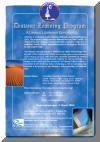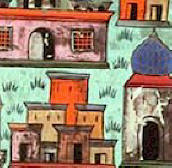|
 Distance Learning Programme - "A unique learning experience" Distance Learning Programme - "A unique learning experience"
The Sydney-based Al-Ghazzali Centre for Islamic Sciences & Human Development is launching a Distance Learning Program (DLP), starting with a Foundation Diploma in Islamic Sciences.
The programme has already taken off in countries like the USA, UK, Canada, New Zealand and Malaysia, and nationally in Victoria and South Australia.
The course consists of 9 Modules, each module comprising of approximately 10 weeks of instructional time, including 9 hours of face-to-face Teacher contact:
Module 1- Aqeedah
Module 2- Personal Obligations (1)
Module 3- Personal Obligations (2)
Module 4- Commerce & Trade
Module 5- Law & Governance
Module 6- Media & D’awah
Module 7- Tazkiyah (1)
Module 8- Tazkiyah (2)
Module 9- Introduction to Usool
Crescents of Brisbane and CCN will be collaborating with the al-Ghazzali Centre Academy to promote the course in Queensland. For a copy of the brochure click
here.
The way the programme works is this. If you are interested in undertaking this course then you will need a minimum of four others in the community who are also wanting to study Islam together. This is where CoB and CCN can help. If you can't round up four others and are wanting to do the course then email theteam@crescentsofbrisbane.org and we will put you in touch with others who have also expressed an interest.
Whilst the program is a distance learning one, al-Ghazzali Centre Academy has worked to retain two traditional aspects of learning
1. The communal aspect of learning together, rather than learning separately and individually; and
2. Face-to-face teacher contact in every module of the coursework, where the teacher will travel to meet with the students and provide a comprehensive explanation of the module being studied.
To find out more about the course as well as fees, course content and other requirements,
register your interest with the Al-Ghazzali website and receive a copy of the DLP Enrolment Guide.
|
|

What do coffee beans, torpedoes, surgical scalpels, arches and observatories all have in common?
Were Leonardo da Vinci’s flight ideas originals?
Who devised the casing for pill capsules and where did Fibonacci learn to flex his mathematical fingers?
The Islamic contribution to the science, culture and heritage of our modern world is often forgotten. From coffee to cheques and the three-course meal, the Muslim world has given us many innovations that we take for granted in daily life.
Each week, over the next few weeks, CCN will bring you an invention inspired by the Islamic World.
The World's First Soft Drink
Sherbet, a juice of crushed fruit, herbs, or flowers has long existed as one of the most popular beverages from and of the Muslim world, winning over Western figures such as Lord Byron. Today, this juice is known by a multitude of names, is associated with numerous cultural traditions, and is produced by countries ranging from India to the United States of America.
"Give me a sun, I care not how hot, and sherbet, I care not how cool, and my Heaven is as easily made as your Persian's." So wrote Lord Byron longingly in 1813, after he had tasted the drink during visits to Istanbul.
Sherbet is made from fruit juices or extracts of flowers or herbs, combined with sugar and water (and sometimes vinegar) to form a syrup that is thinned at any later time with water, ice or even snow. As alcohol is forbidden in Islam, sherbet became one of the most important beverages in Muslim cultures - even part of everyday language. In Egyptian Arabic, for example, "dammu sharbaat" ("his blood is sherbet") is a compliment to a sweet disposition. Children are "sharbaataat" - "cuties" or "sweethearts". Coffee or tea can be served "sharbaat", which means "very sweet". In Central and South Asia, sharbat is used as a given name, and one of National Geographic magazine's most famous cover photographs is the face of Sharbat Gula of Afghanistan.
In villages in eastern Turkey, it is still true today that, after a dowry is agreed on, the groom's family comes to the bride's house and out comes a long-spouted brass or copper ewer, called an ibrik, filled with gul serbeti, or rose sherbet. The woman who has "drunk sherbet" has accepted the groom's suit. Far across Asia, in India and Afghanistan as well, once the groom's family has offered presents, the bride's family reciprocates by offering gol sharbat.
Not only marriage but also births and circumcisions demand sherbet. "As for special occasions, you should soon be offering logusa serbeti, a colored serbet flavored with cloves and other spices, which is offered to visitors after the birth of a child," recounts Mango. In Egypt, one is served finjan erfeh when visiting a newborn child.
Sharbaat was also served to end each day's fasting during the month of Ramadan. In general during Ramadan, in the houses of persons of the higher and middle classes, the stool of the supper-tray is placed in the apartment in which the master of the house receives his visitors a few minutes before sunset... With these are also placed several kullehs (or glass cups) of sherbet of sugar and water-usually one or two more cups than there are persons in the house to partake of beverages in case of visitors coming unexpectedly... Immediately after the call to evening-prayer, which is chanted four minutes after sunset, the master and such of his family or friends as happen to be with him drink each a glass of sherbet.
At the end of the 19th century came America's craze for carbonated medicinal drinks. This was the source of Coca-Cola, which first spread across the country through drugstores and pharmacies. Spreading abroad, Coca-Cola began operating bottling plants in the Philippines and China in 1927, Singapore in 1934, Malaysia in 1936, Morocco and Tunisia in 1947, Pakistan in 1953, Sri Lanka in 1960 and Turkey in 1965.
Yet it seems sherbet retains great symbolic power, even in politics. For example, in the ongoing dispute between India and Pakistan over Kashmir, in 1998 the Indian Express reported that "people forgot three wars and the accumulated bitterness of 50 years" to celebrate a sharbat-based ceremony over the divided border. In 2000, some 25,000 Indian devotees offered Pakistani border guards sharbat. In India's national budgets, sharbat has its own line for the excise tax, listed right next to sugar, vinegar, chocolate, chewing gum and instant coffee and tea. Indian newspapers debate whether sharbat should indeed even be taxed.
--------------------------------------
Sources:
Juliette Rossant, 'The World's First Soft Drink', In Saudi Aramco World Magazine. 2006, Vol. 56 No. 5
http://www.1001inventions.com
|